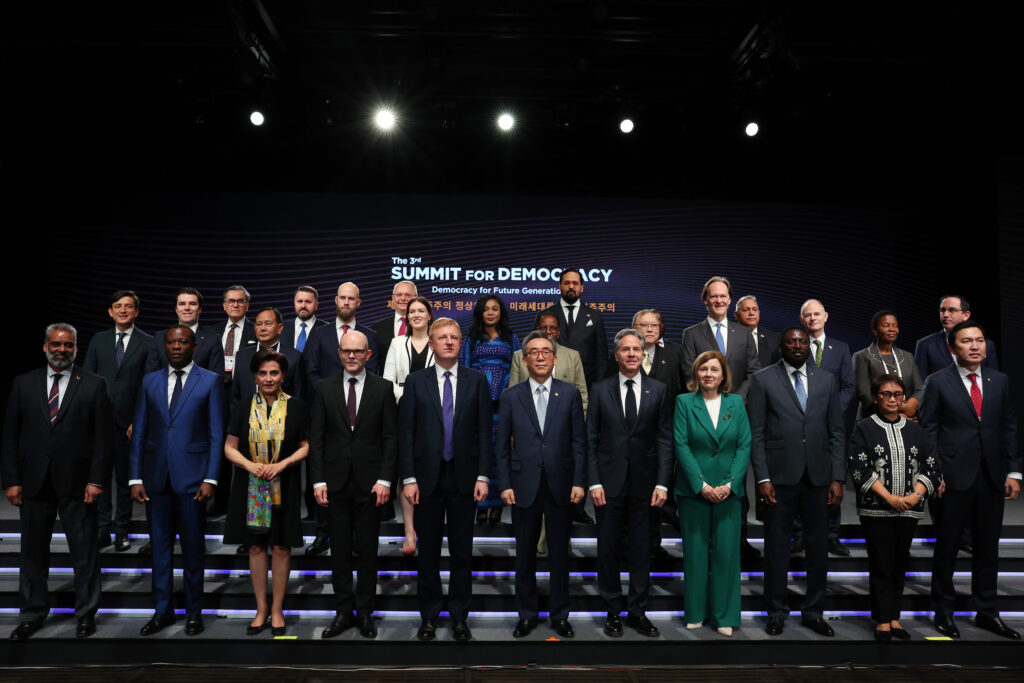The Peninsula
Korea’s 2024 Summit for Democracy Takes Aim at AI

While the theme of the Summit for Democracy hosted by Korea this year was “Democracy for Future Generations,” the predominant undertone appears to have been the role that artificial intelligence (AI) will have in shaping it. Accordingly, during a time where authoritarianism is on the rise, elections are challenged, and political systems are under threat, Seoul’s meeting this week provides reassurance that countries are keeping the top technological challenges in mind while continuing to work together to uphold a rules-based international order.
On day one of the conference, President Yoon Suk Yeol addressed the event’s attendees and touched on the role that AI has in society stating, “fake news and disinformation using artificial intelligence and digital technologies not only violate individual freedoms and human rights, but also threaten democratic systems,” before providing an upbeat conclusion that “artificial intelligence and new digital technologies can promote democracy while protecting the safety of individuals and society.”
This sentiment was echoed by US Secretary of State Antony Blinken when he spoke on the need to make sure that “artificial intelligence and digital tools actually spur democratic renewal and do not undermine it” and remarked on the necessity of supporting democratic values “as authoritarian and repressive regimes deploy technologies to undermine democracy and human rights.”
As the plenary portion commenced on Wednesday, world leaders contributing virtually found common ground on these themes in their addresses. In UN Secretary General Antonio Guterres’s panegyric on the importance of upholding democracy in a world set against increasing authoritarianism, he urged the need for “protecting democracy against technologies perils,” and extolled the participating countries to work together to “build guardrails for artificial intelligence in a digital world,” citing the UN’s own Global Digital Compact as a means for doing so.
Prime Minister Fumio Kishida of Japan’s cautions were similar. He spoke to Japan’s efforts to address them through the creation of Japan’s AI Strategy Council as well as the framework developed through the Hiroshima AI Process at the Osaka G7. He also suggested that the Hiroshima AI Process could include countries beyond the G7.
For President Biden’s part, in addition to speaking on the successes of the commitments made at the prior two summits, he agreed with previous speakers in calling for a common approach to the role that AI has in the international system. He noted that emerging technologies can “bolster democracy or undermine it,” and referenced his meeting with the leaders of AI companies to promote the security of AI systems. Building on this, Biden cited his Executive Order of October 2023 enshrining civil rights protections into their design. The White House released a fact sheet covering the main points of his presentation.
The idea touched on by all these leaders is basic; as foreign and malign actors gain access to tools which can generate “deepfake” voice and video clones of politicians and mass deployed personally tailored propaganda created by generative text, elections are at stake. It will require innovative thinking and international collaboration to deliver solutions to secure them.
At the summit, Korea joined Finland, Germany, Ireland, Japan, and Poland in signing the Joint Statement on Efforts to Counter the Proliferation and Misuse of Commercial Spyware, which was originally formed at last year’s gathering. Participating countries will agree to place guardrails on the export of spyware technologies to prevent their misuse by malicious actors.
Korea’s hosting of the Summit for Democracy brought home the concept of Korea as a Global Pivotal State with influence in shaping global affairs. Even more so as it was the first of its kind hosted outside the United States—although Korea co-hosted virtually last year. Despite its criticisms—including in regard to the United States’ own summit kerfuffles—the ability of the annual summit to bring together global leaders and representatives at a time when the world is at an inflection point demonstrates the continued means for countries to set aside their differences and engage in common dialogue.
Accordingly, this year’s focus on AI also demonstrates that Summits for Democracy can take up the most pressing issues of the day and provide a venue for collaborative approaches to solve them. Korea is now set to host both the Responsible AI in the Military Domain (REAIM) Summit and AI Safety Summit later in 2024, which stresses Seoul’s resoluteness in addressing these topics and in assuming its role as a responsible leader in the governance of AI. Even more so as Korea’s chip companies hasten the global AI transition.
Tom Ramage is an Economic Policy Analyst at the Korea Economic Institute of America. The views expressed here are the author’s alone.
Photo by Jeon Han on the Government of Korea’s Official Flickr Account.
